Passage to Marseille Blu-ray Movie
HomePassage to Marseille Blu-ray Movie 
Warner Archive CollectionWarner Bros. | 1944 | 109 min | Not rated | Nov 10, 2015
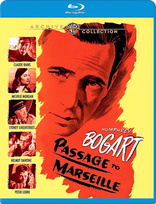
Price
List price:Amazon: $16.58 (Save 25%)
Third party: $16.58 (Save 25%)
Only 10 left in stock - order soon.
Movie rating
7 | / 10 |
Blu-ray rating
| Users | 0.0 | |
| Reviewer | 3.5 | |
| Overall | 3.5 |
Overview
Passage to Marseille (1944)
Jean Matrac, a freedom-loving French journalist, sacrifices his happiness and security to battle Nazi tyranny. Framed by pro-fascists and sentenced to Devil's Island, Mantrac engineers a daring escape with other prisoners, but the escapees are picked up from their lifeboat by a vessel commanded by the pro-fascist Major Duval. Mantrac and the escapees ultimately thwart Duval's plans, enabling Mantrac to continue his battle against Nazism as a member of the RAF.
Starring: Humphrey Bogart, Claude Rains, Michèle Morgan, Philip Dorn, Sydney GreenstreetDirector: Michael Curtiz
| War | Uncertain |
| Drama | Uncertain |
| Adventure | Uncertain |
Specifications
Video
Video codec: MPEG-4 AVC
Video resolution: 1080p
Aspect ratio: 1.37:1
Original aspect ratio: 1.37:1
Audio
English: DTS-HD Master Audio 2.0 Mono (48kHz, 24-bit)
Subtitles
English SDH
Discs
50GB Blu-ray Disc
Single disc (1 BD)
Playback
Region A, B (C untested)
Review
Rating summary
| Movie | 2.5 | |
| Video | 4.5 | |
| Audio | 4.5 | |
| Extras | 3.0 | |
| Overall | 3.5 |
Passage to Marseille Blu-ray Movie Review
The Continuation of a Beautiful Friendship
Reviewed by Michael Reuben November 11, 2015The trailer for Warner Brother's 1944 release Passage to Marseille takes every opportunity to emphasize the film's connections to the studio's triumph two years earlier with Casablanca: same leading man, most of the same creative team, much of the same supporting cast, a similarly anti-Nazi story with a Francophile flavor. Between Humphrey Bogart's star power and the patriotic fervor of a nation deeply committed to winning an epic battle in Europe, the film was a massive success at the box office. But now that Passage to Marseille has passed beyond its immediate historical context, it stands out as one of the oddest entries in Bogart's varied filmography. He could play tough guys, romantic heroes, society men and reprobates, but Bogart, with his distinctive New York twang, was always unmistakably American. In Passage to Marseille, however, the audience is asked to accept Bogie as a Frenchman named Jean Matrac, who is so deeply devoted to liberating his beloved France from tyranny that he survives unfathomable hardship and risks death repeatedly. Bogart reportedly fought for the role, because he believed it was good for the war effort and also because he wanted to continue playing good guys, after many years of playing villains and gangsters, but he is never for a moment convincingly français. Unlike co-star Claude Rains, whose native English intonation and courtly bearing manages to sell his characters as French officers in both Casablanca and Passage, Bogart is, and always will be, an independent Yankee. As Rick, Sam Spade, Philip Marlowe, Harry Morgan in To Have and Have Not or even the twisted Dobbs in The Treasure of the Sierra Madre, he remains an iconic figure, but no one ever thinks of him as "Jean Matrac". Passage to Marseille might be better remembered today if the studio had done what it briefly considered and replaced Bogart with French actor Jean Gabin, one of the stars of Grand Illusion. Still, Passage to Marseille remains a fascinating artifact of Warner's wartime output, in part because of its intricate flashback structure, but also because of the harsh realism (for the era) with which it depicts the bloodshed and cruelty that accompany violent shifts in power. Adapted from a novel by Charles Nordhoff and James Norman Hall (the authors of Mutiny on the Bounty), Passage is a far less romantic tale than Casablanca, although it too involves heroic sacrifice, and some of its heroes pay dearly for their devotion, in ways that no doubt resonated deeply with many contemporary viewers.
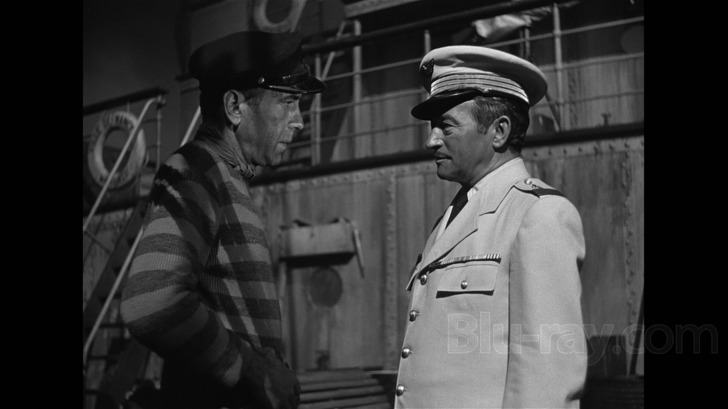
Flashbacks are a useful narrative device for supplying essential information at the right moment, but when they are employed as intricately as in Passage to Marseille, they become something else. By telling an entire story out of order, flashbacks change the way we perceive it, and by introducing us to characters who are then revealed to be very different than they first appear—and then even more different as we proceed further back in time—flashbacks create a unique sense of discontinuity. They become a regular reminder that everyone we encounter has a past, and that events can change the course of a life, so that the person we see in front of us now may have been someone else not so long ago. The Jean Matrac (Bogart) who first appears in the film is a taciturn gunner in a Free French bomber crew based in England in 1942. Even though Matrac says little, something about his bearing catches the eye of a British journalist, Manning (John Loder), who is touring the base to research a news story about these French flyers. The liaison officer, Captain Freycinet (Rains), proceeds to tell Manning how he first met Matrac, a tale that also explains how this French captain came to hold a post at a secret airbase in England. Two years earlier, Freycinet was bound for Marseilles aboard a steamer, the Ville de Nancy, commanded by Captain Malo (Victor Francen), when it rescued five men adrift at sea. One of them was Matrac. The other four were Renault, Marius, Petit and Garou. (They are played, respectively, by Philip Dorn, Peter Lorre, George Tobias and Helmut Dantine, only one of whom, Tobias, is an American actor, and unlike Bogart, he affects a French accent.) Although the men claim to be gold miners who met with a mishap, Freycinet earns their trust sufficiently to obtain the truth—that they are escapees from the penal facility at Devil's Island. The account of their escape, masterminded by a lifer known as "Grandpère" (Vladimir Sokoloff), becomes a second level of flashback. A third level of flashback is the story they tell to Grandpère in the prison camp about the man they choose to lead the escape, namely, Matrac. Before the war, he was the crusading editor of a small newspaper in Paris, whose fiery editorials drew a violent reprisal from local fascist supporters, while the police stood idly by. Fleeing from Paris with his lover and co-worker, Paula (Michèle Morgan), Matrac enjoyed a brief period of happiness but agonized over what to do next. He and Paula married and were on the verge of escaping to America, when he was arrested, tried on false charges and sentenced to Devil's Island. Director Curtiz juggles these multiple time periods with such dexterity that you always know where you are. Passage marches backward in time, then proceeds forward again until it returns to 1942. In the process, it illuminates Matrac's transformation from an idealist and humanist to a hardened man of action who wastes no time on words and kills the enemy without hesitation. The man whom Paula married wrote for a living; the man whom the reporter saw on the tarmac in England writes only letters to his wife, which he drops into the French countryside as his plane returns from missions over Germany. Into those letters Matrac pours the last vestige of the person he once was. Matrac's transformation is a result of the abuse he suffered at Devil's Island; the sacrifices required by the prisoners to make their escape; and the pitched battle for control of the steamer that rescues them when word arrives that France has fallen to the Nazi war machine. Captain Malo, a loyal Frenchman, changes course away from the now subjugated nation, but a passenger, Major Duval of the French Army (Sydney Greenstreet), attempts to seize control out of loyalty to the newly installed puppet government at Vichy. Many lives are lost in the ensuing conflict, which Curtiz stages with remarkable realism for a film of the era, including a prolonged aerial assault on the Ville de Nancy by a German bomber flying over the sea. The irony of the film's title is that no one aboard the ship that set sail for Marseille ever reaches their destination, at least not during the events of the film. The title's "passage" is more metaphorical than geographical, and the journey has many detours.
Passage to Marseille Blu-ray Movie, Video Quality 

Passage to Marseille was photographed by the legendary James Wong Howe, one of the most admired practitioners of black-and-white photography in the history of cinema and an Oscar winner for Hud and The Rose Tattoo. For this 1080p, AVC-encoded Blu-ray release from the Warner Archive Collection, a new 2k scan has been performed by Warner's Motion Picture Imaging facility from a fine grain master positive. The results are an excellent reproduction of a film that was widely regarded as a technical triumph in re-creating exotic locales, including scenes aboard a full-size replica of a Merchant Marine ship, without ever leaving California. The many nighttime shots, in all four time periods, feature deep blacks with subtle illumination picking out specific details of faces and figures that stand out against the darkness (a Wong Howe trademark much copied by other DPs). Daytime shots are sharp and detailed, with finely delineated shades of gray. The exceptions are process shots featuring rear projection or opticals, where the softening of the image is an unavoidable byproduct of the era's effects technology. An obvious example is Bogart's scene from Matrac's newspaper era, when he is reporting from the airport just after the signing of the Munich agreement. The shipboard sequences also contain a number of effects shots and also several others where the focus puller was obviously struggling to keep pace with the rapid movement of the camera. In general, having been through the entire film twice, it is apparent to me that any softness in the image is inherent to the source and that WAC's presentation is as tightly focused an image as Passage to Marseille is likely ever to have. Following its usual approach, WAC has mastered the film with an average bitrate of 34.99 Mbps. There is nothing to fault in the compression.
Passage to Marseille Blu-ray Movie, Audio Quality 
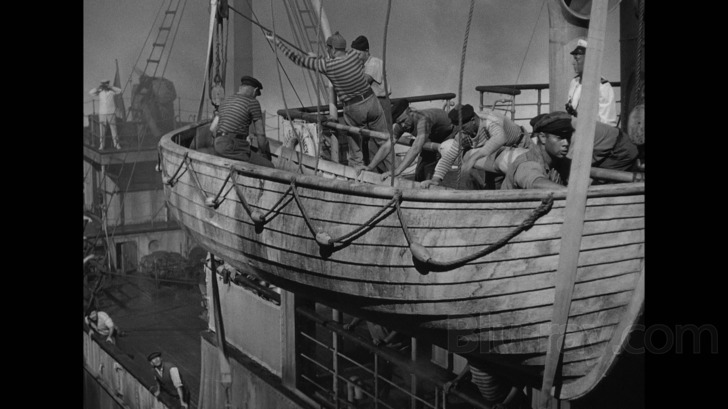
Passage to Marseille's original mono soundtrack has been encoded in lossless DTS-HD MA 2.0, with identical left and right channels. The source is clean and free of interference, distortion or noticeable hiss. The dialogue is clear, and the sound effects of the aircraft, gunfire and explosions have solid impact for a film of this vintage. Max Steiner, the composer for Casablanca, wrote the varied score, which ranges from romance to martial themes. Steiner also wrote the music for the film's unofficial theme song, "Someday I'll Meet You Again", which is sung by Corinna Mura during a nightclub scene (with lyrics by Ned Washington), and is repeated in melody throughout the film.
Passage to Marseille Blu-ray Movie, Special Features and Extras 
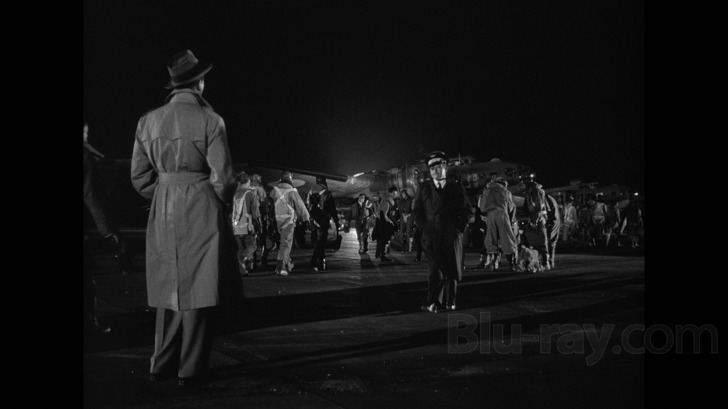
The extras have been ported over from Warner's 2006 DVD release of Passage to Marseille.
- Warner Night at the Movies
- Uncertain Glory Theatrical Trailer (480i; 1.37:1; 2:13).
- Newsreel (480i; 1.37:1; 0:56): Training for women Marines.
- I Won't Play (480i; 1.37:1; 17:56): This 1944 short stars Dane Clark as Joe "Fingers", a soldier who tells his buddies tall tales of his adventures in show business, and Janis Paige as Kim Karol, the Hollywood star who, according to Fingers, learned everything she knows from him.
- Jammin' the Blues (480i; 1.37:1; 10:15): Another 1944 short, this one featuring a bevy of talented jazz musicians in a moodily lit jam session. Marie Bryant provides the vocals.
- The Weakly Reporter (480i; 1.37:1; 6:41): A Chuck Jones-direct Merrie Melody from 1944 with a war-time theme. The voiceover mimics a newsreel, and the jokes involve topics like rationing, shortages and war bonds.
- The Free French: Unsung Victors (480i; 1.33:1; 16:51): A group of English and French historians provide an overview of the political and military events in France that serve as essential background to Passage to Marseille.
- Breakdowns (480i; 1.37:1; 6:46): This 1944 short is an extended gag reel drawn from multiple films, including Thank Your Lucky Stars.
- Theatrical Trailer (1080p; 1.37:1; 2:17): Just for fun, count the references to Casablanca.
Passage to Marseille Blu-ray Movie, Overall Score and Recommendation 
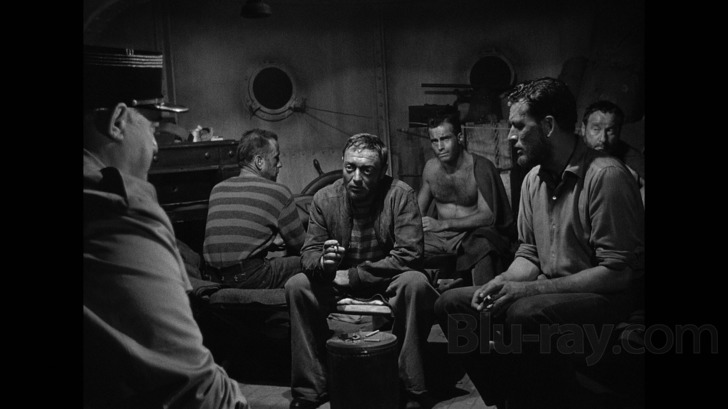
In a famous scene in Casablanca, the resistance leader Victor Laszlo rouses the entire crowd at Rick's to a demonstration of patriotic fervor by leading them in singing France's national anthem, "La Marseillaise". Passage to Marseille can be viewed as a deeper exploration of that moment and of all the sweat and sacrifice required to translate its sentiment into action. The idea was inspired, and the execution was skillful. With a different star, the film might have been a classic. It's fascinating nonetheless, and WAC has done their usual stellar job. Highly recommended.
Similar titles
Similar titles you might also like

Billy Budd
1962

Man Hunt
Limited Edition to 3000 - SOLD OUT
1941

The Mortal Storm
Warner Archive Collection
1940

The Long Voyage Home
Limited Edition / Import
1940

The Bridges at Toko-Ri
1954

Lifeboat
1944

Action in the North Atlantic
1943

The Sea Wolf
1941

Edge of Darkness
Warner Archive Collection
1943

Mosquito Squadron
1969

Captains Courageous
1937

To Have and Have Not
Warner Archive Collection
1944

The Caine Mutiny
1954

One of Our Aircraft Is Missing
1942

Morituri
Saboteur: Code Name Morituri | Limited Edition to 3000
1965

Outcast of the Islands
1951

Against All Flags
1952

The Purple Plain
1954

Behold a Pale Horse
Limited Edition to 3000
1964

Armored Attack!
The North Star
1943